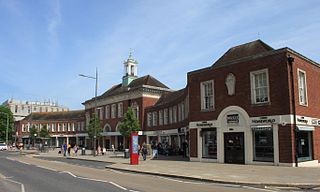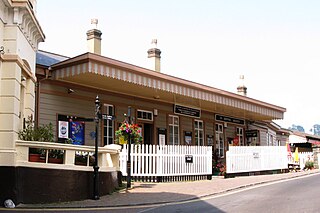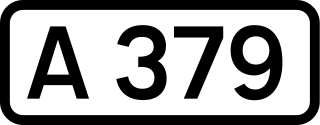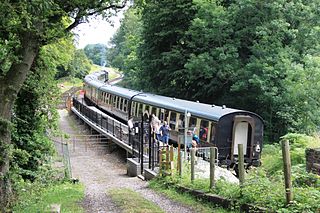
Torbay is a unitary authority with a borough status in the ceremonial county of Devon, England. It is governed by Torbay Council, based in the town of Torquay, and also includes the towns of Paignton and Brixham. The borough consists of 24.27 sq mi (62.9 km2) of land around the east-facing Tor Bay, part of Lyme Bay on the English Channel. A popular tourist destination, Torbay's sandy beaches, mild climate and recreational and leisure attractions have given rise to its nickname of the English Riviera. The neighbouring districts are South Hams and Teignbridge.

Paignton is a seaside town on the coast of Tor Bay in Devon, England. Together with Torquay and Brixham it forms the borough of Torbay which was created in 1968. The Torbay area is a holiday destination known as the English Riviera. Paignton has origins as a Celtic settlement and was first mentioned in 1086. It grew as a small fishing village and a new harbour was built in 1847. A railway line was opened to passengers in 1859 creating links to Torquay and London. As its population increased, it merged with the villages of Goodrington and Preston. Paignton is around 25 miles (40 km) north east of Plymouth and 20 miles (32 km) south of Exeter.

The Dartmouth Steam Railway, formerly known as the Paignton and Dartmouth Steam Railway, is a 6.7-mile (10.8 km) heritage railway on the former Great Western Railway branch line between Paignton and Kingswear in Devon, England. Much of the railway's business is from summer tourists from the resorts of Torbay, who travel to Kingswear, where the Dartmouth Passenger Ferry takes them across the River Dart to Dartmouth.

The Riviera Line is the railway between the city of Exeter, towns Dawlish and Teignmouth, and the English Riviera resorts of Torbay in Devon, England. Its tracks are shared with the Exeter to Plymouth Line along the South Devon sea wall. It is part of the Network Rail Route 12.

Exeter St Davids railway station is the principal and largest railway station in Exeter, also the busiest station in Devon.

Exeter Central railway station is the most central of the stations in the city of Exeter, Devon, United Kingdom. It is 171 miles 30 chains (275.8 km) down the line from London Waterloo. The station is smaller than Exeter St Davids on the west side of the city. Great Western Railway manages the station and operates most services, with South Western Railway providing the rest. It is the second busiest station in Devon, and the fourth busiest in South West England.

Newton Abbot railway station serves the market town of Newton Abbot in Devon, England. It is 214 miles 5 chains (345 km) from London Paddington. The station today is managed by Great Western Railway, who provide train services along with CrossCountry.

Weston-super-Mare railway station serves the seaside town of Weston-super-Mare in North Somerset, England. It is situated on a loop off the main Bristol to Taunton Line, 137 miles 33 chains from the zero point at London Paddington via Box.
Kingswear is a village and civil parish in the South Hams area of the English county of Devon. The village is located on the east bank of the tidal River Dart, close to the river's mouth and opposite the small town of Dartmouth. It lies within the South Devon Area of Outstanding Natural Beauty, and has a population of 1,332, reducing to 1,217 at the 2011 census.

Torquay railway station is on the Riviera Line and serves the seaside resort of Torquay, Devon, England. It is 219 miles 79 chains (354 km) from London Paddington.

Torre railway station is a stop on the Riviera Line in Torquay, Devon, England. It is 219 miles 12 chains (353 km) down the line from London Paddington, via Box. The station is managed by Great Western Railway but is not staffed. The station buildings are Grade II listed.

Goodrington Sands railway station is on the Dartmouth Steam Railway, a heritage railway in Devon, England. It is close to Goodrington Sands beach and the Splashdown Quaywest water park in Paignton. There has been no scheduled service at the station since 2020.

Churston railway station is on the Dartmouth Steam Railway, a heritage railway in Torbay, Devon, England. It is situated beside the main road to Brixham and close to the villages of Churston Ferrers and Galmpton. There has been no scheduled service at the station since 2020.

Kingswear railway station is the terminus of the Dartmouth Steam Railway, a heritage railway in Devon, England. It is situated in the centre of Kingswear, on the shores of the River Dart opposite Dartmouth.

The Dartmouth and Torbay Railway was a broad gauge railway linking the South Devon Railway branch at Torquay with Kingswear in Devon, England. It was operated from the outset by the South Devon Railway.
The Torbay and Brixham Railway was a 7 ft broad gauge railway in England which linked the Dartmouth and Torbay Railway at Churston railway station, Devon with the important fishing port of Brixham. It was a little over two miles long. Never more than a local branch line, it closed in 1963.

The A379 is a road in the English county of Devon. It links points on the edges of that county's two principal cities, Exeter and Plymouth, by an indirect and largely coastal route. The A38 provides a faster and more direct inland route between Exeter and Plymouth, whilst the A380 provides a similarly faster route between Exeter and the Torbay area. However the A379 serves many small coastal communities and ports along the coast. The indented nature of the South Devon coast means that the road is usually out of sight of the sea, but the many rivers and estuaries are crossed by bridges and, in one case, a cable ferry.
The railway branch line from Newton Abbot to Kingswear in Devon, England, is unusual as a large majority of the stations are still open for traffic. Of the eleven stations, seven are still open so there are only four disused railway stations on this line, a much lower proportion than most similar lines that do not serve big cities.

Goodrington is an area of Paignton in Devon, England. It is situated in Tor Bay and lies between Paignton town centre and Brixham, less than 1 mile (1.6 km) south of central Paignton. Its beach is known as Goodrington Sands.

Greenway Halt railway station is a small railway station on the Dartmouth Steam Railway, a heritage railway in Devon, England. It is situated near the northern end of the 495-yard long Greenway Tunnel and convenient for visitors to the Greenway Estate, the historic home of Agatha Christie.




















